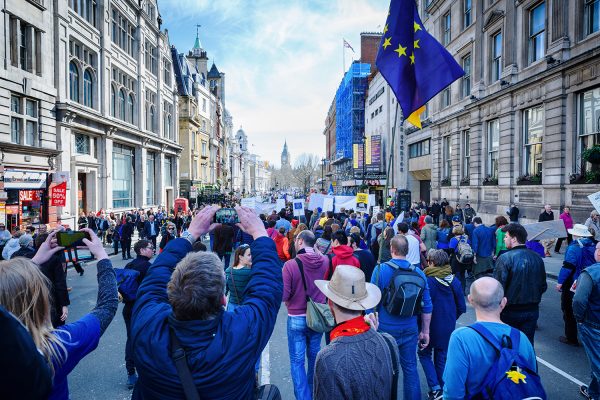
George Eaton argues in Britain’s New Statesman that age has replaced class as the nation’s best predictor of voting intentions.
Middle-class support for Labour and working-class support for the Conservatives rose in the last election. At the same time, the left attracted almost two-thirds of the youth vote and the right the support of almost two in three pensioners.
Young people have long been more progressive than their elders, but this wide an age gap is unusual.
Culture war
In a way, this is a manifestation of Europe’s blue-red culture war: the struggle between cosmopolitan, college-educated, urban voters with liberal economic and social views on the one hand and inward-looking, lower-educated voters in small towns and the countryside on the other.
That tension was heightened by the Brexit referendum. Older, rural voters didn’t feel the benefits of the EU and supported leave. Younger voters, who might (want to) study or work abroad were appalled.
It’s also a consequence of boomers hoarding the benefits of liberalization (property wealth, generous private pensions) and leaving the young with its burdens (expensive housing, job insecurity, student debt, inadequate or non-existent pensions).
Finally, austerity hit the young hardest. The 2010-15 coalition government tripled university fees, abolished educational subsidies for teenagers and capped working-age benefits. By contrast, state pensions were protected by a “triple lock” so they would rise by inflation, average earnings or 2.5 percent — whichever was highest. Means-tested pension credits, winter fuel payments, free bus passes and free TV licenses for seniors were untouched.
Good ol’ days
Those in or near retirement don’t feel they have it so much better, though.
Focus groups conducted by Demos, a think tank, of predominantly whites over the age of fifty found a longing for the good ol’ days when industries were nationalized, workweeks were reduced to three days and homosexuality was illegal.
No matter the reality that privatization has improved many services and Britain is freer and richer today than it ever was.
Demos heard all the familiar laments of nativists everywhere: political correctness has run amok, you’re not allowed to be proud of your country anymore, there are too many immigrants and they’re all on welfare… Attitudes like that led to 52 percent voting for Brexit.
Backlash
British millennials don’t have it as bad as their American counterparts, but, like them, they realize that an older generation has rigged the system in its favor.
Brexit — much like the election of Donald Trump — added insult to injury and galvanized Britons in their twenties and thirties.
Expect a backlash in the years to come.
